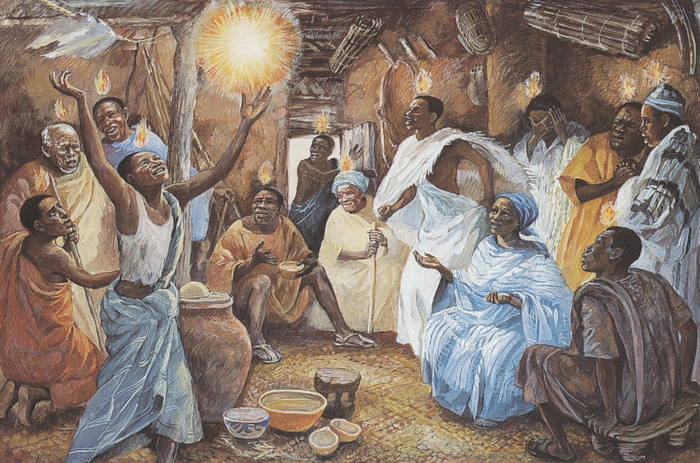Engaging this module
You are invited to explore this module by reading the content, watching the presentations and videos,
and responding to the suggested exercises and activities.
Who is the
Holy Spirit?
HOLY SPIRIT PRAYER
Come, Holy Spirit! Blow into our midst in a powerful way. Blow new life in and through us!
Come, Holy Spirit. Fill us with the breath of your being.
Come Holy Spirit. Set our hearts on fire with your love.
Come Holy Spirit. Fill our uncertain places with the conviction of grace, faith, and truth.
Come, Holy Spirit. Challenge us to recognize and share your presence in boldness.
Come, Holy Spirit. Empower us to share your gifts to us with the world around us.
Come, Holy Spirit! Amen.
TIME FOR REFLECTION
A Time for Reflection is designed to give you choices to begin to consider the presence of the Holy Spirit in worship liturgy and in worship spaces. Read these choices. Take a few moments to reflect.
Look carefully at a worship bulletin or printed service. Circle all the places the Holy Spirit is mentioned in the liturgy. Is the Holy Spirit mentioned more at times of the service? Why might this be the case?
Sit quietly in the space where you most often worship. (If this is not possible, close your eyes, and imagine this space in as much detail as you can.) Reformed places of worship are often very plain visually. During the Reformation, as a reaction to the highly decorated Roman Catholic sanctuaries, the Reformers stripped churches of most visual imagery to help congregants focus on the Word of God in scripture and proclamation. In recent decades, Reformed Christians have begun to appreciate that color, symbolism, and art can enhance our experience of the Word of God and have added paraments, stained glass windows and other forms of art into worship spaces.

Look around. Using your senses, imagine you are in the midst of worship. Where do you see symbols of the Holy Spirit? Feel the Holy Spirit? Taste the Holy Spirit? Smell the Holy Spirit? Hear the Holy Spirit?
HOW DOES THE BIBLE DESCRIBE THE HOLY SPIRIT?
This presentation will explore how the Bible describes the Holy Spirit. If you would like to read along with the presentation, please click on the button below to download the transcript.
REFLECTION TIME
Even when we are the only teacher in the room, we never teach alone. We teach side by side with the “Companion” (Jn. 14:26 CEB), the “Advocate” (NRSV), the “Helper” (NKJV), the “Comforter” (ASV), “the one who is coming to stand by you” (PHILLIPS).
Consider the following words for the Holy Spirit as a new way of thinking about her.
Write down the ones that speak to you as they appear that you wish to add to your own list of insights into the Spirit’s work.
NOUNS: God’s breath like wind; giver of life; anointer; messenger of good news; liberator; proclaimer of good news; healer, flames, intercessor, advocate, teacher
VERBS: Creates, inspires, heals, blesses, frees, redeems, affirms, advocates, baptizes, prays, intercedes, instructs
ACTIVITY:
Now imagine you are preparing a lesson to teach. Review the words you wrote down. What can you expect from the Spirit when you prepare to teach and when you are teaching?
CONCLUDING PRAYER:
Prayer: Holy Spirit, I long to know you better – who you are, how you speak to me, how you inspire and guide all who call upon your name. Breathe on me. Speak to me in a language I understand. Light in me a flame of faith to grow and be born anew. Amen.
THEOLOGY OF THE HOLY SPIRIT:
JUSTIFICATION, SANCTIFICATION, VOCATION
For Reformed people, this section contains “theological words.” How do we think about the Holy Spirit and the action of the Holy Spirit in our lives? Throughout history, Reformed Christians have focused on “justification,” “sanctification,” and “vocation.” Let’s see if we can examine these words together.
How did we do? Are you totally confused about the work of the Holy Spirit? Don’t worry! Theologians and denominations have been struggling for centuries to put these concepts into words. Next, you will have the opportunity to explore those attempts as you explore these Theological Affirmations from APCE’s partner denominations. Every denomination has affirmations about who the Holy Spirit is and what she does for us.
Please click on the dropdown menus found below to explore the Theological Affirmations from partner denominations in the Association of Partners in Christian Education:
PC(USA)’s “A Brief Statement of Faith.”
We trust in God the Holy Spirit,
everywhere the giver and renewer of life.
The Spirit justifies us by grace through faith,
sets us free to accept ourselves and to love God and neighbor,
and binds us together with all believers
in the one body of Christ, the Church.
The same Spirit
who inspired the prophets and apostles
rules our faith and life in Christ through Scripture,
engages us through the Word proclaimed,
claims us in the waters of baptism,
feeds us with the bread of life and the cup of salvation,
and calls women and men to all ministries of the church.
In a broken and fearful world
the Spirit gives us courage
to pray without ceasing,
to witness among all peoples to Christ as Lord and Savior,
to unmask idolatries in Church and culture,
to hear the voices of peoples long silenced,
and to work with others for justice, freedom, and peace.
In gratitude to God, empowered by the Spirit,
we strive to serve Christ in our daily tasks
and to live holy and joyful lives,
even as we watch for God’s new heaven and new earth,
praying, “Come, Lord Jesus!”[1]
Every single line is packed with an idea that warrants reflection on our part so that we can recognize the Spirit in our midst. Only then will she become a living reality to us. She is the verb of God and Jesus in the church, in the world, and in our hearts. There is no Church without the Holy Spirit, nor is there any life in Christ. There is no baptism, no communion, no sermon, no prayer, no singing, no sense of justice, no healing, no courage to live, no hope, no joy.
The Spirit may be worthy of a personal prayer or two.
[1] https://www.presbyterianmission.org/what-we-believe/brief-statement-of-faith/
Moravian Church
Moravians on Holy Spirit
But just as the Holy Scripture does not contain any doctrinal system, so the Unitas Fratrum also has not developed any of its own because it knows that the mystery of Jesus Christ is attested to in the Bible, cannot be comprehended completely by any human mind or expressed completely in any human statement. Also, it is true that through the Holy Spirit the recognition of God’s will for salvation in the Bible is revealed completely and clearly. The doctrine of the Trinity should serve as a reminder that the reality of God is a mystery beyond our reasoning.[1]
From the Moravian Hymnal
Hymn 519 “Come, Let us All with Gladness Raise”
Text: Matthew of Kunwald 1457 Tune: Michael Weisse 1531
Recording on Join Our Voices on www.Moravian.org under Covid 19 resources
Come let us all with gladness raise
A joyous song of thanks and praise
To God who rules the heavenly host,
God, Father, Son, and Holy Ghost.
For God, in grace and tenderness,
Regarded us in our distress,
, Yea, to our aid himself he came,
Let all adore God’s holy name.
God gave us faithful ones to lead
And help us in our time of need
But Lord all power is yours alone,
And you the work must carry on.
Father in heaven, fulfill your word:
Grant us the Spirit of our Lord,
That, through your truth, which cannot fail
We may o’er every ill prevail.
And in your love may we abide,
Estranged from none by wrath or pride
Among ourselves at unity,
And with all else in charity.
Thus may our lips your praises sound
Our hearts in steadfast hope abound:
Till you in heaven our steps shall bring
Where saints and angels hail you King.
Note: The three documents for the Moravians around creeds and confessions are Apostles Creed, The Ground of the Unity, and Moravian Covenant for Christian Living.
[1] “Ground of the Unity,” pg. 70.
Christian Reformed Church in North America
We believe that the Old and New Testaments are the inspired Word of God, the only infallible rule for faith and life. We affirm three creeds – the Apostles’ Creed, the Nicene Creed, and the Athanasian Creed – as ecumenical expressions of the Christian faith. We also affirm three confessions – the Belgic Confession, the Heidelberg Catechism, and the Canons of Dort –as historic Reformed expressions of the Christian faith, whose doctrines fully agree with the Word of God.
Heidelberg Catechism
God the Holy Spirit
Lord’s Day 20
Q & A 53
- What do you believe concerning “the Holy Spirit”?
- First, that the Spirit, with the Father and the Son, is eternal God.1
Second, that the Spirit is given also to me,2
so that, through true faith,
he makes me share in Christ and all his benefits,3
comforts me,4
and will remain with me forever.5
The Presbyterian Church in Canada
From Statement of Faith: “Living Faith”
Chapter Four – God the Holy Spirit
4.1 The Holy Spirit is God with Us
4.1.1 The Holy Spirit is the Spirit of the triune God
and is One with the Father and the Son.
The Holy Spirit is the Lord and Giver of Life,
the Renewer and Helper of God’s people.
By the Spirit, God is present in the world
the source of all goodness and justice.
By the Spirit, God convinces the world of sin
and testifies to the truth of Christ.
By the Spirit, Christ is with his church.
4.2 The Holy Spirit Enables People to Believe
4.2.1 The Spirit enables people to receive
the good news of Christ,
to repent of their sins,
and to be adopted as children of God.
As we hear and respond to the Gospel
we freely turn to Christ.
When we have turned and repented,
we recognize that the Spirit enabled us to believe.
4.2.2 The Holy Spirit accompanies us on our journey of faith.
We may not always be sure of this presence.
Yet God’s Spirit is with us,
sometimes gently, sometimes powerfully,
guiding us in the midst of life,
our comfort and our help.
Christian life is a pilgrimage:
it begins, continues, and ends in God.
4.3 The Holy Spirit Forms and Equips the Church
4.3.1 By the Spirit, Christ calls the church into being
and unites us to himself and to each other.
The Holy Spirit is in all who know Christ.
4.3.2 The Holy Spirit is the Spirit of truth.
We pray as a church to be guided into truth
knowing that such truth may disturb and judge us.
4.3.3 The presence of the Holy Spirit is seen
in love,
joy, peace, patience, kindness,
goodness, loyalty, gentleness, and self-control.
4.3.4 The Spirit blesses us with various gifts.
We seek to discover those gifts
and to use them for our Lord.
Faithful loving service is a sign
that the Spirit is present.
The presence of the Spirit is evident
where people are made whole, encouraged,
and enabled to grow in Christ.
4.3.5 Come, Holy Spirit!
Reformed Church in America
The church website lists the following documents as Foundational Reformed Confessions: The Heidelberg Catechism, The Belgic Confession; The Canons of Dort; and The Belhar Confession.
Article 11: The Deity of the Holy Spirit
We believe and confess also
that the Holy Spirit proceeds eternally
from the Father and the Son—
neither made,
nor created,
nor begotten,
but only proceeding
from the two of them.
In regard to order,
the Spirit is the third person of the Trinity—
of one and the same essence,
and majesty,
and glory,
with the Father and the Son,
being true and eternal God,
as the Holy Scriptures teach us. The Belgic Confession
Did you learn anything new about the Holy Spirit and the work of the Spirit?
As you’ve discovered the words just keep on coming! The Holy Spirit is busy.
This next activity refers back to the list of words you had in Section 2. We are going to add a few more for you to consider.
ACTIVITY
Our lists of nouns and verbs grow longer. Write down your personal choices from these for your personal reflection on the Holy Spirit.
NOUNS: doctrine; personal friend, companion, trinity, God
VERBS: relates, sanctifies, loves, binds, renews, inspires, mediates, calls, grants courage, witnesses, unmasks idols, listens; works for justice, freedom, and peace; in the sacraments, feeds and baptizes us.

PRAYER
Holy Spirit, we want to find our own words to share our understanding of you. The theologies of great scholars and church creeds stand on their own, but they don’t succeed in expressing what is in my heart and mind. As you did on the Day of Pentecost, fill us with a language that we understand and can share with others so they can understand as well. We want to continue to grow as one of your devoted teachers. Amen.
WHO IS THE SPIRIT TO ME?
Click on the options below to explore how you can receive and recognize the Holy Spirit in your life.
The Examen
Most often in hindsight, we see how our lives and our communities are daily being affected by the Holy Spirit. A ritualistic way we can take a backward glance at our life is one our ancestors in the faith have shared.
The Examen is an ancient spiritual discipline called “a simple practice of noticing.” When it is hard to tell if the Holy Spirit is active in your life, this practice may be helpful. In their book, Sleeping with Bread: Holding What Gives You Life, Dennis, Sheila, and Matthew Linn describe Examen this way:
For many years, we have ended each day the same way. We light a candle, become aware of God’s loving presence, and take five minutes of quiet while we ask ourselves two questions.
For what moment today am I most grateful?
For what moment today am I least grateful? (pages 5-6)
Examen is looking backwards at the day that was and stopping to noticing. When considering the activity of the Holy Spirit, lighting a candle can help us remember the Holy Spirit coming to the first disciples at Pentecost like a flame. The light illumines our lives, our hearts, our minds, our spirits, dispelling the darkness. Our vision of God’s Spirit in our lives is often clearer in hindsight.
There are no magic questions to ask to focus your vision on God’s presence during your day. Consider these as possibilities:
When did I feel most alive today?
When did I most feel life draining out of me? (page 7)
Possibly, the Holy Spirit is at work in us when we feel most alive and enervated. Or, possibly we are most in need of the Holy Spirit’s presence and energy when we feel drained and weighed down. This exercise encourages us to stop, reflect, and take time to be grateful for the gift of God’s Holy Spirit in our lives, and to ask the Holy Spirit to be more active within us.
Simply becoming aware and noticing God’s activity in our lives can help us be more attentive to the Holy Spirit’s presence during the day, not just at the end. Consider adding this ritual practice at the end of your day to help you recognize all the ways God’s Spirit is alive and active in you. This recognition may create a change in behavior – more loving, more sharing, more praising. But recognizing the Spirit’s work in our lives still does not answer the question of how we received the Spirit.
Worship & Sacraments
In the Reformed Tradition, we believe that anyone can receive the Holy Spirit at any time. But in worship we ritually enact that experience at the Sacrament of Baptism, during the Sacrament of the Lord’s Supper, during the Confirmation of young people or anytime people are welcomed into membership, and during ordination services when the church recognizes the calling of individuals to ordered ministries within a particular congregation or denomination.
Let’s look at the corporate examples of Confirmation and receiving new members. Every church does this important work differently. Unfortunately, for various reasons, some churches rarely get to experience young people confirming the vows that were taken at their Baptisms or new members welcomed into their communities. But we can remember. If the people involved have not been baptized, that act happens first. During Baptism, words are used such as, “Send your Spirit to move over the water that it may be a fountain of deliverance and rebirth. Wash away the sin of all who are cleansed by it. Raise them to new life and graft them to the body of Christ. Pour out your Holy Spirit upon (Name), that she/he/they may have the power to do your will and continue forever in the risen life of Christ.” (Book of Common Worship, pg. 411) Following Baptism as the liturgy moves into Confirmation, words like these are used, “Gracious God, by water and the Spirit you claimed us as your own, cleansing us from sin, and giving us new life. You made us members of your body, the church, calling us to be your servants in the world. Renew in (Name) the covenant you made in their baptism. Continue the good work you have begun in them. Send them forth by the power of your Spirit to love and serve you with joy, and to strive for justice and peace in all the earth, in the name of Jesus Christ our Lord.” (Book of Common Worship, pg. 422).
Following this, Confirmation candidates (not usually new members) are asked to kneel, and hands are laid on them as a prayer is offered, such as: “O Lord, uphold (Name) by your Holy Spirit. Daily increase in them your gifts of grace….” In some churches, the candidate is anointed with oil used to make the sign of the cross on the forehead or the back of the hand. “(Name), remember your baptism and be thankful, and know that the Holy Spirit is at work within you” (BCW, pg. 423).
Most Confirmands will tell you that now, aside from nervousness, they don’t feel any different following their Confirmation. They might remember older people laying hands on them or the smell and feel of the oil. That is normal. But, if they begin to look back at their days, their weeks, their months and years following Confirmation, they may begin to see that the Holy Spirit has been at work. The Spirit was moving in the choices they made, in the people who entered their lives, in the ones who recognized gifts for service they did not realize they possessed.
Consider ordination. To function, churches need officers and clergy. If you or someone you know has been asked to consider serving as an officer, spiritual gifts for ministry have been discerned by others and now these folks must wrestle with that call for themselves. During the ordination liturgy for Deacons, Elders and for Ministers of the Word and Sacrament, words like, “Gracious God, pour out your Spirit upon your servant (Name), whom you called by baptism as your own. Grant him/her/them the same mind that was in Christ Jesus.” The Holy Spirit is called upon for the building up of the church, “so that we may be for you a holy people” (BCW, pg. 471). Sometimes, the recognition of the Holy Spirit in each person is seen first by the community, affirmed by the individual, and then ritually confirmed.
Prayer
Another way we receive and recognize God’s Holy Spirit is through prayer. In fact, every Lord’s Day, we ask God’s Spirit to be present with us helping us praise and pray. We invite her to come and join us. We receive her presence at least once a week during worship, if not more often as we pray alone. The invitation to the Spirit to join us corporately and individually is called the epiclesis. Through prayer we ask to better understand scripture or something we are studying; through prayer we ask for guidance to teach a lesson to children or youth; through prayer we ask for patience in dealing with family, friends and sometimes members; almost anytime we pray, we invite the Spirit to be present. Receiving God’s Spirit may not be as dramatic as Pentecost in Acts, with flames and wind and different languages. However, the Spirit might subtly create new thoughts, new feelings, new behaviors in us through prayer in worship and at home.
Looking Back
Sometimes, the best way to see clearly is to look backwards. It is often hindsight that helps us acknowledge the Holy Spirit has been guiding, leading, and prodding us along our faith journey our entire lives. At the time, we may have had no awareness.
God’s Spirit may be simply received and recognized in the unexpected. When we feel God close to our hearts, that may be the Holy Spirit. When we pray and sense God, or we have no words adequate for the situation, the Holy Spirit will pray for us and may pray through us. When we are conscious of an answer to prayer, that may be the Holy Spirit. We may sense the Spirit when we worship in community and feel a peace we don’t quite understand. When we debate or discuss a contentious matter in the family or in a meeting of a judicatory body, and come to an amicable consensus, that may be the Spirit. When we or someone we know offers kindness or generosity to another, that may be the Spirit. When we defend or protect someone who is in harm’s way, the Holy Spirit may be working within us.
Receiving the Spirit in our lives may happen through worship, prayer, and when we least expect it. It may take practice to recognize the Spirit in us. Sometimes others will see it first. No matter how or when it happens, we need to trust that God’s Spirit is alive and active in each of us for the betterment of the church and all God’s people.
The Holy Spirit is definitely one of the richest and most exciting characters we will encounter in our faith journeys. Let’s reflect.
REFLECTION EXERCISES:
- How have you experienced the Holy Spirit? Think of a couple of concrete examples from your own experience.
- In John’s Gospel, the Holy Spirit is given to the disciples by Jesus as breath. Our breath is a sign of life, of creation, of God’s Spirit. Paying attention to our breath can help us notice our emotions. Deep, open breathing helps us express our acceptance of life. Tense, short breaths usually accompany anger and frustration. Watching our breath focuses our attention and calms our mind.
Author Anthony de Mello tells of a Jesuit friend who sought instructions from a Hindu guru in the art of prayer. The guru said to him, “Concentrate on your breathing.” My friend proceeded to do just that for about five minutes. Then the guru said, “The air you breathe is God. You are breathing God in and out. Become aware of that and stay with that awareness.” (Kulp, p, 42)
Simply breathing in and out is an exercise in prayer and spiritual discipline we can do anywhere at any time. Jesus breathed God’s Spirit on his disciples – then and now.
Consider trying a Breath Prayer. Think to yourself each time you breathe in, “Breathe on me” and as you breathe out, “breath of God.” Imagine the Holy Spirit filling you with oxygen for life and for service.
Other phrases to use during a breath prayer:
Be still/And know that I am God
Fill me Holy Spirit/With life anew
I have called you by name/You are mine
Come, Holy Spirit/My soul inspire
Come, Holy Spirit/Kindle a flame in my heart
Come. Holy Spirit/Dwell among us
Spirit of the Living God/Fall afresh on me
Spirit of gentleness/Stir me from placidness
GIFTS OF THE SPIRIT AND FRUIT OF THE SPIRIT

Prayer: Holy Spirit, I tend to look at others in admiration of their gifts for ministry. I easily slip into a list of what I am not good at. Forgive me…so that I can affirm the gifts you have given me. I come in search of a compliment from you. I really want to know what you think. Help me listen and hear. And then bless me to live faithfully with all my giftedness. Amen.
What gifts do I have for teaching? How is teaching in the church different from teaching in public schools? How might gifts differ?
In scripture we see that Paul organized the congregations he founded around the Gifts of the Spirit and the Fruit of the Spirit. He hoped each gift given and received from the Holy Spirit would be used by the recipient for the benefit of others. To this end, each church family would be a community of love and caring dedicated to the needs of others.
The Holy Spirit gives individuals a ministry within the congregation:
-
- The Spirit gives to one person a word of wisdom.
- The Spirit gives to one person a word of knowledge.
- The Spirit gives to one person a measure of faith.
- The Spirit gives to one person the gift of healing.
- The Spirit gives to one person the gift of miracles.
- The Spirit gives to one person the gift of prophesy.
- The Spirit gives to one person the gift of discernment between “spirits.”
- The Spirit gives to one person the gift of tongues or glossolalia.
- The Spirit gives to one person the ability to interpret (translate) the tongues into the common language of the day.
Paul did not define the parameters of the gifts or say they were limited to just one person. Anyone who has taught children in church has heard many wise insights. And everyone has knowledge to share, simply different kinds.
REFLECTION
Discerning gifts is essential to church life. Our list is different, however. We need people with a variety of skills and abilities to fulfill the church’s mission. Some are for ordered ministries in the church such as pastor, elder, deacon, and trustee. The challenge is to perceive what gifts the Spirit has given everyone.
Activity:
Choosing from Paul’s list, what are your spiritual gifts? How did you become aware that you had these gifts?
- How does God use these at home? At church? At work? In your community?
- How might you continue to embrace the fruit of the Spirit? What might you need to set aside?
- Christian educators are always on the lookout for those who can teach faithfully, do crafts, lead games, provide snacks and meals, and mentor children with special needs. How can you empower those with gifts for leadership to help you recognize, affirm, and call upon the gifts and fruit of the Spirit in your congregation?
WHAT THE HOLY SPIRIT IS NOT
Opening Prayer
Holy Spirit, accept my affirmations about you and forgive my misunderstandings. You are beyond my ability to comprehend in your essence. I hope to remain open to being startled by your revelations to me. Make room in my heart for your ever-growing love and care. Surprise me I pray! Amen.
Is the Holy Spirit a ghost?
The Holy Spirit is not a ghost as we think of ghosts today. However, when affirming our faith using the Apostles’ Creed, many still say, “I believe in the Holy Ghost.” “Ghost” was an Old English word used for Spirit. It did not refer to a Halloween ghost. As the English language changed, the word ghost became obsolete for God’s Spirit. We still have remnants of Old English in worship today. In the traditional version of The Lord’s Prayer, for example, we find, “Our Father, who art in heaven, hallowed be thy name.” The words “art,” “hallowed” and “thy” are uncommon in daily English speech. “Art” has very different meanings than a verb tense for “to be.” Traditions must be explained from time to time. NOTE: The Ecumenical version of The Lord’s Prayer uses, “Our Father in heaven, hallowed be your name.”[1]
[1] The ecumenical, modernized version of the Lord’s Prayer was released by the English Language Liturgical Consultation (ELLC) in 1988. https://www.liturgytools.net/2010/09/our-father-ellc.html
Where did the Holy Spirit come from?
First, the Holy Spirit was not created by Jesus. Second, the Holy Spirit was not new or first introduced in the New Testament with Pentecost. Reformed Christians believe the Holy Spirit was present at creation and the Hebrew word ruach, translated as “breath,” is the Spirit. As the early church struggled to describe the Spirit, there was much controversy, finally settled with this description from The Nicene Creed:
We believe in the Holy Spirit, the Lord, the giver of life, who proceeds from the Father and the Son, who with the Father and the Son is worshiped and glorified, who has spoken through the prophets.
The addition of the phrase “and the Son” is still debated by Christians from the Eastern and Western Churches.
Is the Holy Spirit a “minor” person of the Trinity?
Oh no! The Holy Spirit is distinct but not separate from the other persons of the Trinity. The Trinity is often depicted with images that look hierarchical, like the triangle with God the Father on the top point and God the Son and God the Holy Spirit on the base points. Since it is difficult to explain the relationship of the three persons of the Trinity in words, it is also difficult to say what we mean in a metaphor or a drawing. Metaphors like three forms of water (steam, liquid, and ice) for instance, appear to be helpful but can also take us in directions we don’t want to go.
Recently, theologians have found a more helpful way of explaining the simplicity and the complexity of the Trinity. This concept has been recovered from the Eastern Church and is called perichoresis. Perichoresis is a Greek word that means “indwelling”: it roughly translates to “round dance” or “circle dance.” Circles have no beginnings or endings and no part can appear more important or powerful. In this image, the three persons of God join hands in a joyous dance in which no one dancer takes the lead. They all dance at the same pace to the same rhythm. They work together as one. They invite us all to join in the dance. No dance lessons required. No competition naming the best dancers. There is only joy in the partnership of this heavenly dance.
Author Joyce Rupp shares a vision of this in her poem “May I Have This Dance.”[4]
As you read it, imagine the Holy Spirit’s involvement.
[4] Rupp, Joyce. May I Have This Dance, Notre Dame: Ave Maria Press,1994, pg. 11-12.
Does the Holy Spirit only care about and for Christians?
The Holy Spirit is God and we should be reticent to say what God does and doesn’t do, other than what God has revealed to us. Genesis tells us God created all humans, male and female, and breathed God’s Spirit into them. Every human everywhere is one of God’s children. If God is love, can there be a child God does not love? Can there be a person whom the Spirit shuns and does not care about?
Assuming the Spirit speaks to every individual as she does to us, the question becomes, “Does the person recognize her?” Hard to say. Paul writes in Romans that the reality of God is visible in the natural world around us. The Spirit has many ways, as well, of making herself known. Saying she can’t, is just as presumptuous as saying she does. The Spirit goes where she wills.
Is the Holy Spirit my conscience?
Cartoons used to depict our struggles to make choices with an angel on one shoulder and the devil on the other. They would banter back and forth trying to influence our decision by shouting into our ears. This is not what the Holy Spirit does. She is beside us and within us. She listens and asks questions. She goes with us into the complexity of life decisions. Truth is not one answer or another. There are infinite possibilities and nuances. Our life journey is one of twists and turns and ups and downs and good choices and poor. We don’t need a voice saying, “I told you what to do,” raising feeling of guilt. We need someone who loves us no matter what we choose; someone who helps us remember lessons learned, and who seeks wisdom with us always.
ACTIVITIES
Congratulations! You did it! We have provided you with a few more choices to do at your own pace. These activities involve music and art. Allow the Spirit to continue to inspire you and those you love and serve. May we share one final prayer together.
Thank you, Holy Spirit, for the journey we have shared together in this study. Remind me what I have learned so that every day I might hear you speak to me. Without you I am lost; with you I will find my way. Amen.
-
- God, Jesus, and the Holy Spirit have invited you to join them in the divine dance of witness, service, mission and so much more. Imagine you have just entered the dance. Who is on your left? Your right? Who do you see across from you? Catch their eyes and smile. What music are you hearing?
-
- What are your three favorite pieces of music? If they are available, play them all and allow your body to move. Imagine now, the Trinity has joined you in the dance. When the music is over, close your eyes. How and what are you feeling? Listen to the music again as you write or draw a prayer for the church.
3.Create an illustrated hymn using #292 in Glory to God, As the Wind Song. This is an ecumenical hymn; the text writer is from New Zealand and music writer is from Singapore.
As the Wind Song
As the wind song through the trees,
as the stirring of the breeze,
so it is with the Spirit of God,
as the heart made strangely warm,
as the voice within the storm,
so it is with the Spirit of God.
Never seen, ever known
where this wind has blown
bringing life, bringing power to the world,
as the dancing tongues of fire,
as the soul’s most deep desire,
so it is with the Spirit of God.
As the rainbow after rain,
as the hope that’s born again,
so it is with the Spirit of God,
as the green in the spring,
as a kite on a string,
so it is with the Spirit of God,
making worlds that are new,
making peace come true,
bringing gifts, bringing love to the world,
as the rising of the yeast,
as the wine at the feast,
so it is with the Spirit of God
Text: Shirley Erena Murray, 200
Music: Swee Hong Lim, 2004

CLOSING PRAYER
Thank you, Holy Spirit, for the journey we have shared together in this study. Remind me what I have learned so that every day I might hear you speak to me. Without you I am lost; with you I will find my way. Amen.







